If you’ve found this article then you’ve probably gotten dental implants recently or are thinking about it. After meeting with your dentist and going over all the details involved, a question pops into your head on your way home. Can you go through metal detectors with dental implants?
Whether your impending vacation or work environment brought this up, have no worries. In this article we have all the answers you’re looking for, so let’s get to it!
Can You Go Through Metal Detectors With Dental Implants?
Yes, you can go through metal detectors with dental implants.

However, there is a grey area when it comes to dental implants and metal detectors. There are different kinds of materials used that may have an impact, depending on the implant your dentist and you selected, or your insurance company recommended.
And if for some reason (that we will discuss) a metal detector does go off when you and your dental implants walk through, airport security has a few procedures to follow that are non-invasive and painless, so no need to panic!
Or, if this doesn’t happen at an airport, but somewhere else like a courthouse or government building, there are procedures to handle it without making a big ordeal over it.
After all, you certainly aren’t the first person to ever get dental implants.
But before we get into all that, let’s start with the basics.
What Are Dental Implants?
Dental implants are devices placed in your jawbone to which replacement teeth can be attached. This is done by a dental surgeon for the purpose of dental prosthetics, or to support a dental bridge or denture.
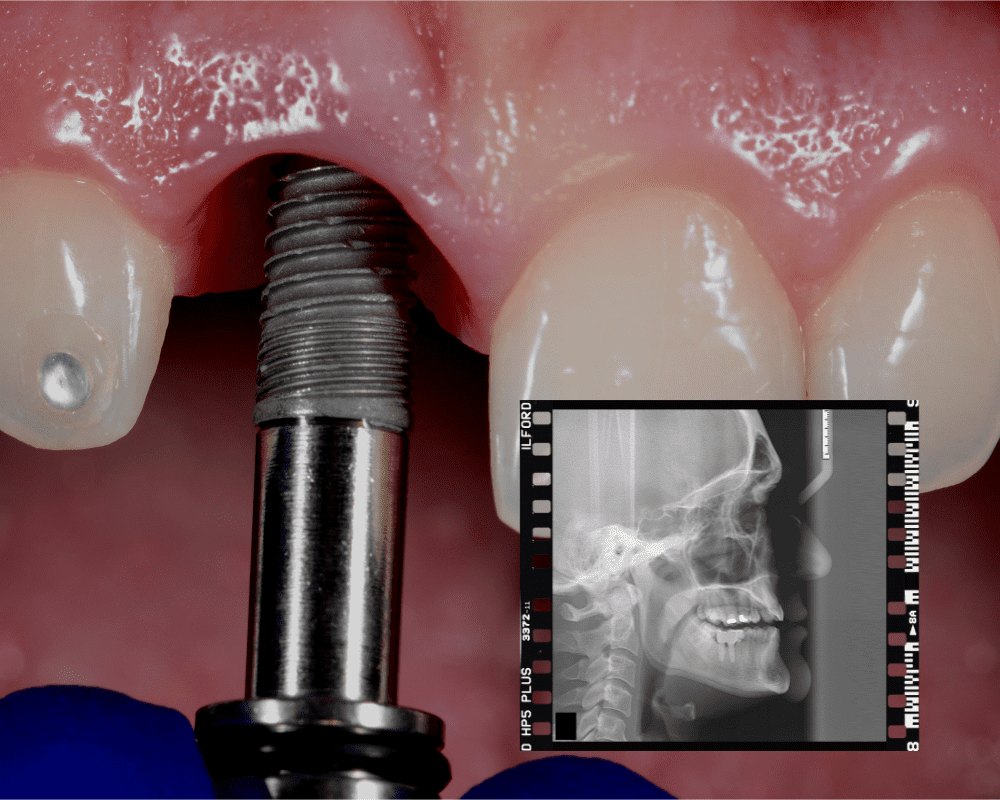
The most common type of dental implant is called an endosteal, or root-form, implant. It looks like a small screw and is placed directly into your jawbone. After the area around the dental implant heals, usually, a couple of months, a second surgery is performed to attach a post to the dental implant, referred to as an abutment.
Once the dental implant has bonded with your jawbone, a replacement tooth (called a crown) is attached to the post.
The reason that months of time are needed between phases is to allow for osseointegration. Osseointegration is the process of your jawbone fusing to the dental implant. This takes time, and during this period, as biological fluids flow over the dental implant a thin film of bone cells starts to form.
This is important because dental implants are meant to last a lifetime, and in order for this to happen, they need to have a solid foundation. The dental implant acts like the root of your tooth and needs to be securely placed in order for everything else that goes on top.
Are Dental Implants Considered Metal?
Dental implants are made of different materials. But yes, the most common dental implant is made with a titanium alloy, which is considered a metal.
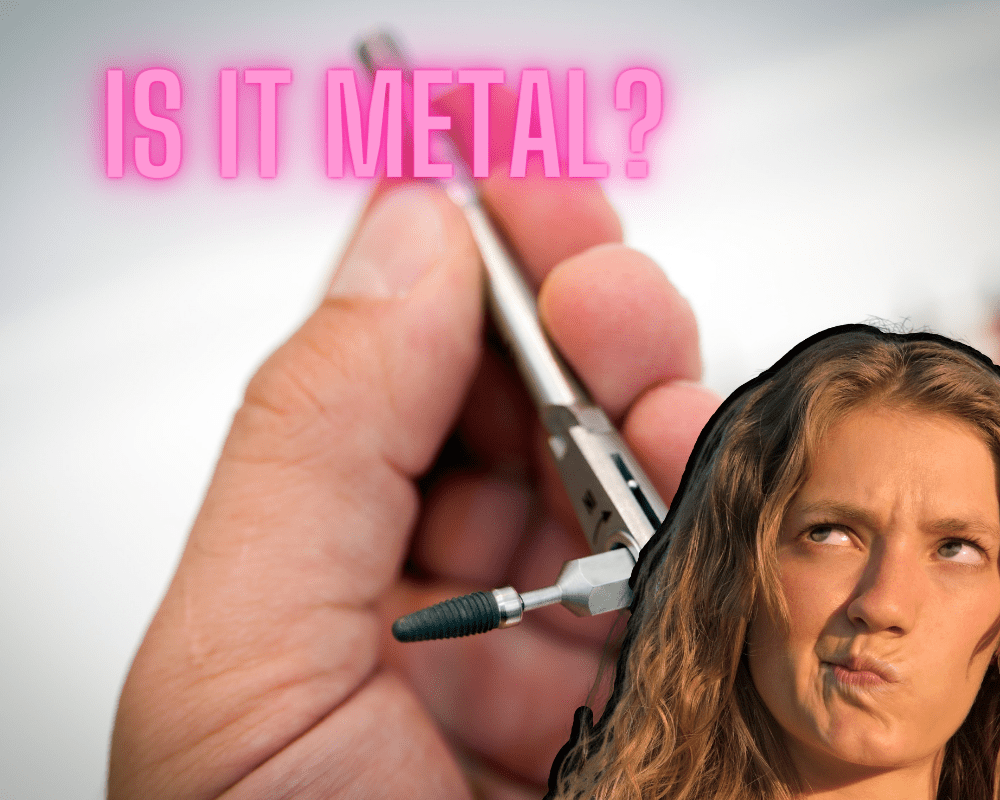
Titanium is a lightweight metal that is very strong and resistant to corrosion. It’s also biocompatible, meaning it won’t be rejected by your body, making it the perfect choice for dental implants and braces.
An important attribute of titanium is that it is nonmagnetic, so it won’t set off most metal detectors. Although, I should clarify that while titanium is nonmagnetic, dental implants generally use a titanium alloy and that by definition is a mixture of two or more chemical elements, usually metals.
So, depending on what the other metal elements are in the titanium alloy dental implants, it’s possible for them to be magnetic and set off a metal detector.
But this is rare, and more often than not dental implants made of titanium alloys won’t set off metal detectors.
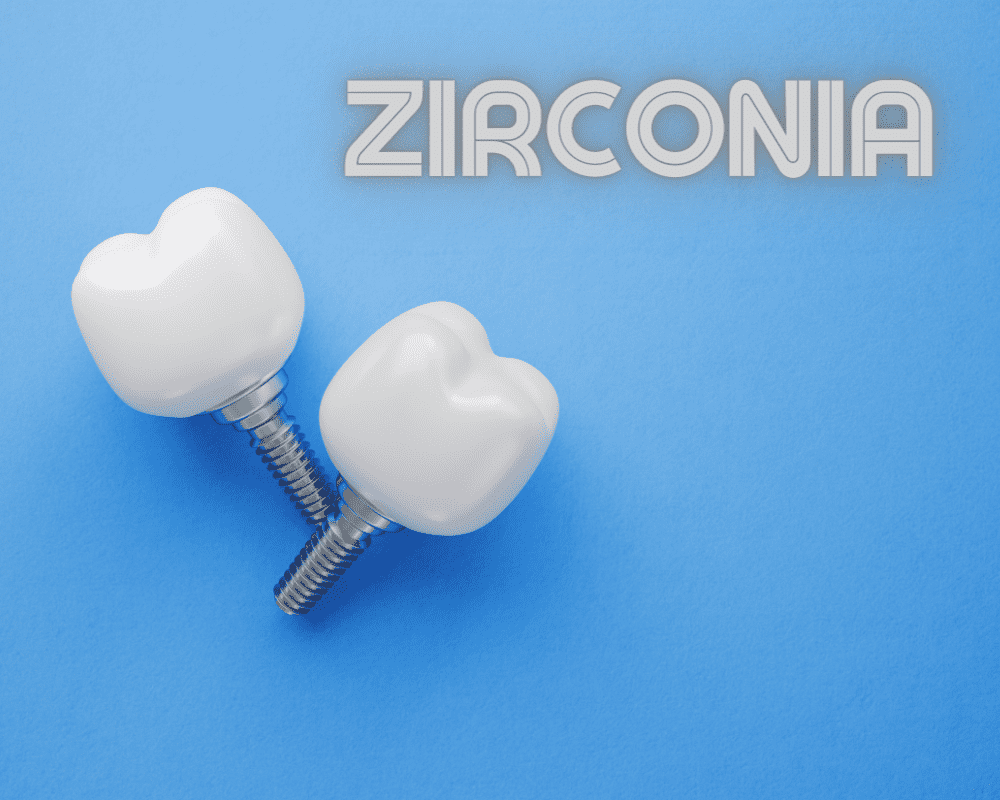
The other common material used for dental implants is zirconia.
Zirconia is a strong ceramic material that is also biocompatible and nonmagnetic. So, like dental implants made of titanium alloys, dental implants made of zirconia are unlikely to set off metal detectors.
Zirconia implants have become a popular alternative recently because they’re esthetically pleasing. They’re the closest thing to dental implants that look like your natural teeth.
Plus, they are metal-free.
Do Dental Implants Cause Problems at Airport Security?
No, dental implants don’t cause problems at airport security.

As we just discussed, dental implants are made of materials that won’t set off metal detectors.
The metal detectors used by the TSA generally work by detecting changes in the electromagnetic field.
Non-ferrous metals, like titanium, aluminum, and brass, don’t disrupt the electromagnetic field and will pass right through the metal detector without setting it off. Unless the machine is a high-end metal detector.
You can expect the TSA to be using these high-end devices. But, even if you have a purer metal in your implant, the size of the implant is so small, that it would be extremely unlikely for a metal detector to pick it up.
According to a published review of 37 separate studies, the average dental implant contains a biological width (BW) of 3.5 mm of titanium.
And if you do happen to set off a metal detector, most security measures are prepared for this scenario.

In most cases, all you’ll have to do is go through a secondary screening that involves going through a hand-held metal detector or being patted down by a security officer. This will allow them to verify you don’t have any dangerous items on your person.
If you happen to go through a full-body screening or have to use an x-ray machine, dental implants will show up on these scans.
But again, this is no cause for alarm as dental implants are not dangerous and pose no threat to security. Not to mention this is something TSA officers probably see more times a day than you’d imagine.
FAQ’s About Metal Detectors and Dental Implants

Do Dental Implants Rust?
No, dental implants don’t rust. Dental implants are not impervious to rust but they are resistant.
This is because dental implants are usually made of titanium alloys. And as we discussed, titanium is resistant to corrosion.
The other common material used for dental implants, zirconia, is also resistant to corrosion.
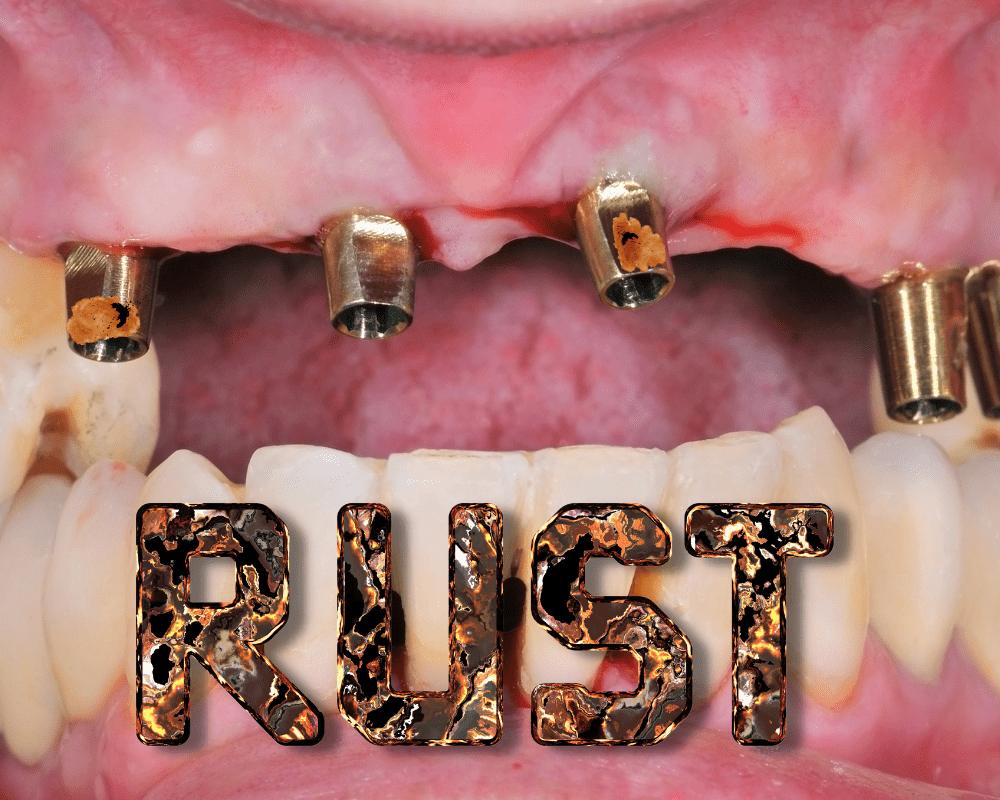
The implants themselves are meant to last a lifetime, but the dental crowns or abutments placed on top of them may eventually need to be replaced.
However, it’s important to note that while dental implants don’t usually rust, this doesn’t mean they can’t suffer from corrosion.
Dental implants can develop a condition called peri-implantitis, which is an inflammation of the tissue around the dental implant. This is can be caused by interaction between the metal implant and the saliva in your mouth. Believe it or not, saliva contains ions and electrolytes that react negatively to contact with metal.
If left untreated, peri-implantitis can lead to bone loss and eventually cause the dental implant to fail.
So, if you think you might have peri-implantitis, it’s important to see a dentist so they can properly diagnose and treat the condition.
Do Fillings Set Off Metal Detectors?
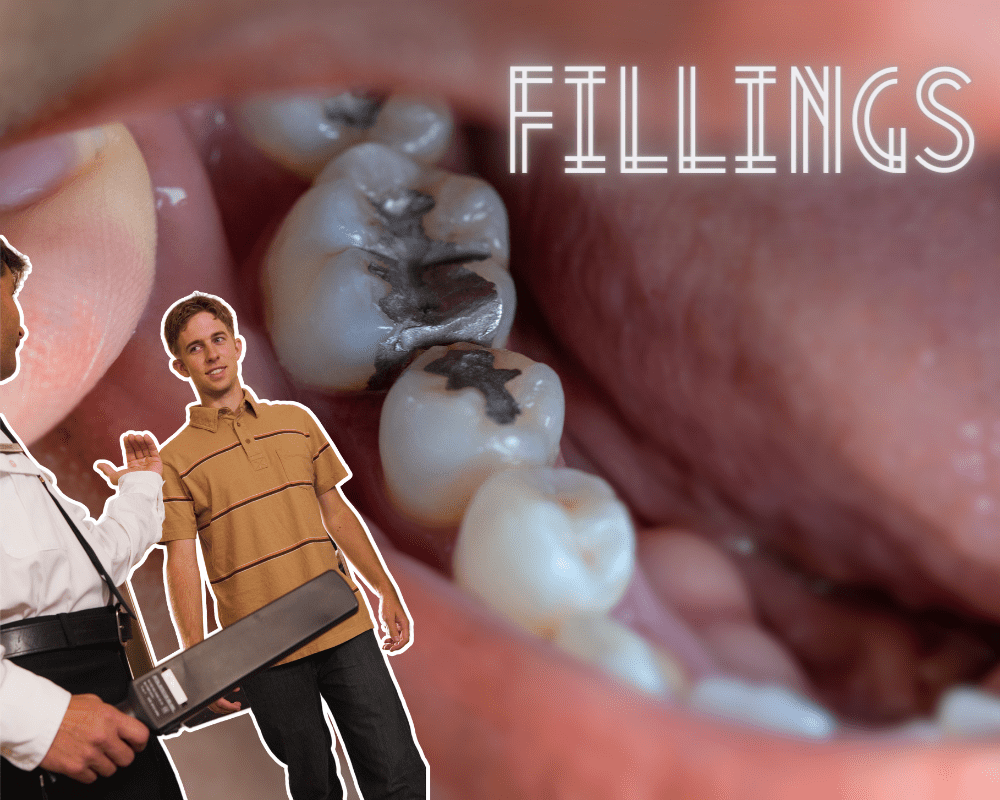
No, dental fillings generally don’t set off metal detectors.
The most common type of dental filling is made of a material called amalgam. Amalgam is a mixture of metals that includes silver, tin, zinc, and copper. While these metals are considered non-ferrous, they’re not as non-ferrous as titanium.
There are other filling material options such as gold, porcelain, and composite resin fillings.
So, it’s possible that a dental filling could set off a metal detector.
However, this is highly unlikely as the amount of metal in a dental filling is very small, and the sensitivity of a walkthrough metal detector would never be set that high.
Not even the brass zipper on your jeans would be enough to alert a metal detector.
And even if you do have a dental filling that sets off a metal detector, again, this would only lead to a secondary scanning measure to clear you of any potential danger.
Do Crowns Set Off Metal Detectors?
No, dental crowns do not usually set off metal detectors.

Dental crowns are made to fit over the top of a dental implant or a natural tooth.
They’re usually made of porcelain, ceramic, or composite resin. These materials are non-ferrous and won’t set off a metal detector. However, sometimes a dental crown can be made of metal like gold or palladium.
If this is the case, I still wouldn’t bet on a metal detector being set strong enough to go off when you pass through it. The amount of metal used to make the crown would be too small for most detectors to pick up.
What if I’m Allergic to Metal?
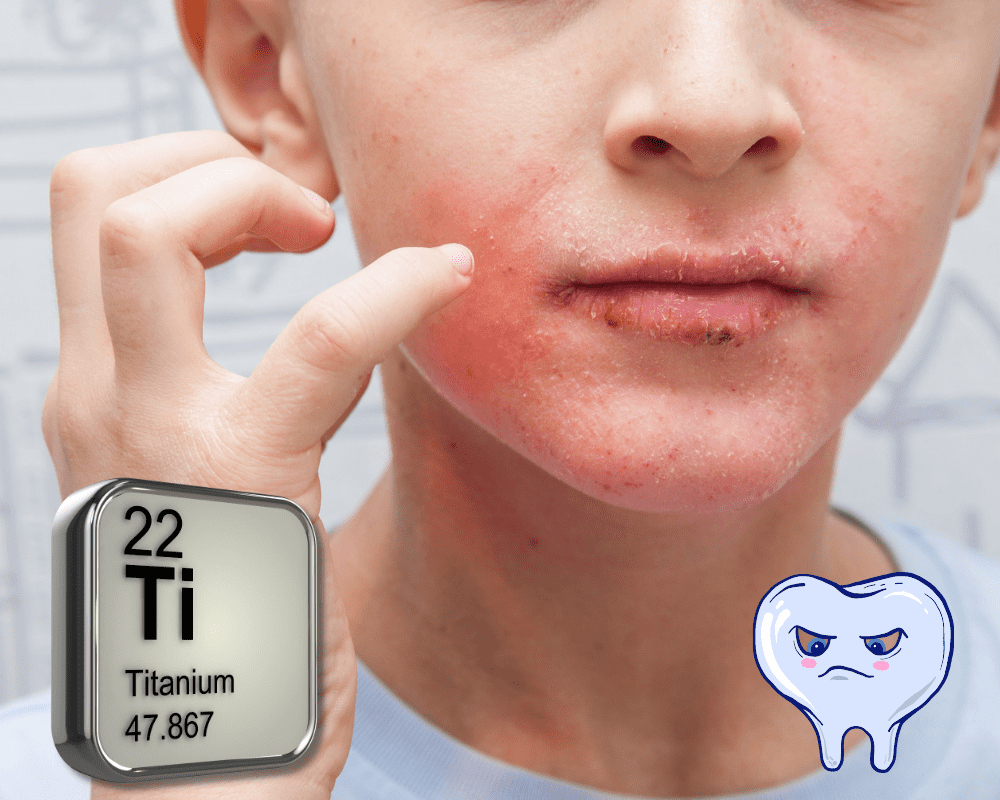
If you’re allergic to metal, dental implants are probably not the best option for you.
Dental implants are made of either titanium or zirconia. And while these materials are considered non-toxic, they can still cause an allergic reaction in some people.
However, allergies to implants are extremely rare and even more difficult to test for.
The most common symptom of a metal allergy is contact dermatitis, which is a rash that develops where the metal comes into contact with the skin.
Other symptoms can include hives, itching, and swelling. If you experience any of these symptoms after getting dental implants, it’s important to see a doctor so they can properly diagnose and treat your allergy.
Conclusion
So, can you go through metal detectors with dental implants?
The answer is yes, in most cases dental implants won’t set off a metal detector.
However, there are some exceptions to this rule. And if you have a dental filling or crown made of metal, it’s possible that it could set off the detector, but just as unlikely as with a titanium implant.
9 times out of 10, you’ll pass through with no problems at all. But if you’d rather not take the chance, you can inform security of your dental implants before you go through the detector.
If you’d like to learn more about the effects of metal detectors, maybe you’d be interested in reading up on their impacts when interacting with pregnant women.
And that’s all there is to it! I hope this article helped answer your question. Thanks for reading!





